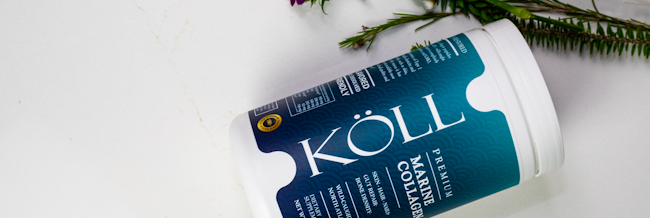Collagen
What Does Collagen Do?
Collagen is a big buzz word of late. Why is everyone talking about and supplementing with this protein? Wat does collagen do? And when there are so many different types of collagen on the market, how do you know what type to take? Like, what is better between bovine and marine collagen—and what are collagen peptides? And how does collagen work when we supplement with it?
We’ll get to all these questions below, but first, let’s come to a solid understanding of what exactly collagen is—and why it’s so important for the human body.
What is Collagen?
Collagen is a protein. In fact, it’s the most abundant protein in the human body, creating the bulk of our physical bodies. It’s found in our bones, muscles, tendons, cartilage, blood and skin.
Specifically, collagen makes up the connective tissue. Connective tissue connects all the other tissues, holding all of our cells together and giving our tissues strength and flexibility. It’s the support system or the structure that holds the rest of our bodies together.
There are in fact 28 different types of collagen in the body. However, Type I collagen is by far the most prevalent, making up about 90% of all the collagen in our bodies. Types II, III and IV are also found in high quantities, and are also essential for overall health.
Collagen is found in all animals, not just humans. Mammals and sea creatures—such as fish and sharks—produce collagen. That’s why most collagen supplements are bovine (beef) or aquatic.
Although our bodies create collagen naturally, it begins to break down and is not produced in as great of quantities as we age. That’s why people supplement. But we’ll get more into the supplements in a minute. First let’s review how our bodies make collagen and how we can support this natural process.
How Do Our Bodies Create Collagen?
Our bodies create collagen by combining amino acids, which are the building blocks of protein. And where do we get these amino acids? From eating proteins, such as fish, dairy and beans.
Our bodies also need zinc, vitamin C, and copper to produce collagen. If you want your body to produce healthy amounts of collagen, it’s important to get a well-rounded diet that includes all of these nutrients.
Following is a breakdown of some of the foods that contain large amounts of the amino acids and nutrients essential for collagen production:
- Proline: Is an essential amino acid with high sources of Proline found in animal products and other high-protein foods, such as organ meats like liver, bone broth, beef, chicken, and fish.
- Glycine: Another essential amino acid. Glycine is found in gelatin powder, bone broth, poultry skin, seafood and meat, dairy products, legumes, spinach, dried seaweed, watercress, asparagus and cabbage
- Vitamin C: We all know we need Vitamin C for our immune systems, but we also need it for collagen production. It is found in high quantities in citrus fruit, strawberries, bell peppers, tomatoes, broccoli, cabbage and more.
- Zinc: One of the minerals essential for collagen production, zinc is found in whole grains, nuts such as cashews, shell fish, eggs, dairy and more.
- Copper: Another critical mineral, copper is found in organ meat (especially liver), shellfish, beans (such as kidney beans and chickpeas), pumpkin seeds, spinach and more.
It’s always important to eat a diet high in the nutrients our bodies need to be healthy, strong and flexible. And, while it’s important to eat a diet rich in the nutrients listed above for efficient collagen production, we can also support our bodies by supplementing with collagen to ensure our bodies are getting as much as needed.
Why Supplement With Collagen?
Collagen is responsible for keeping our bodies strong and healthy. For example, it’s essential for healthy, strong nails, full hair, muscle mass, strong bones and supple skin. Collagen supports digestive health, eye health, heart health and kidney health.
Collagen also keeps our joints healthy and can ease the pain of osteoarthritis. There’s even evidence that supplementing with collagen can help build muscle mass, when taken alongside resistance training.
However, we know that as we age our bodies produce less collagen. We also know that certain things such as sun exposure, lack of sleep, alcohol consumption and cigarettes will lead to collagen breaking down at a greater rate.
So, why supplement with collagen?
Well, many people take collagen to keep their skin hydrated and elastic. Afterall, collagen makes up roughly 70-80% of the entire skin surface. People take collagen to keep their skin looking young and healthy. Others take collagen to keep their joints and tendons flexible, strong and pain free. Others take collagen to assist in building muscle mass.
Many take collagen for a combination of these reasons. However, pretty much everyone who supplements collagen does so to keep their bodies fit, healthy and youthful.
How Does Collagen Work?
Collagen supplements work by giving your body the necessary proteins it needs to build collagen. When your body absorbs the short chain amino acids through the small intestine, it can then put them to use wherever the body most needs collagen.
Collagen works best when taken in high quantities. In fact, research indicates that 10 grams per day is needed to see results.
Luckily, Köll Marine Collagen powder dissolves easily into water, coffee or juice and is flavorless, so it’s easy to incorporate such a large dose into your routine.

Collagen also works better when you take collagen supplements that are highly bioavailable. Bioavailable means easily absorbed by the body and obviously, if you’re taking collagen, you’ll want maximum absorption to ensure you’re really getting the required amount necessary to see a big difference.
Types of Collagen Supplements
There are primarily two types of collagen supplements on the market: Bovine Collagen (made from beef) and Marine Collagen (also known as fish collagen).
Marine collagen is far more bioavailable than beef collagen. It’s also far higher in Type I collagen—the most abundant type of collagen in the body and essential for that supple skin and strong hair and nails we love.
Collagen supplements come in capsules, gummies, drinks and powders. The powders allow you to get the highest dose, which, as mentioned above, is really important when it comes to collagen supplementation.
When looking at collagen powders, you’ll want to make sure you’re getting collagen peptides, because these are the most bioavailable. But what are collagen peptides?
What Are Collagen Peptides?
A peptide is a short chain of amino acids. So, collagen peptides are simply shorter chain collagen proteins.
Because they’re so short, they are much more bioavailable to the body. And, because they’re more bioavailable, you can take smaller doses to achieve the same results as the longer chain collagen supplements.
Collagen peptides are often called under their full name: hydrolyzed collagen peptides.
This refers to the process through which the peptides are broken down. The process is called hydrolysis and it uses water—not toxic chemicals—to break the chain of amino acids to the smallest and most usable form: hydrolyzed collagen peptides.
Incidentally, it’s also thanks to this process of shortening the amino acid chains that makes powdered collagen so easy to dissolve into any liquid, hot or cold.
In Conclusion…
Now we know how collagen works and why it can be a fantastic supportive supplement!
Just remember to always eat a complete diet that supports collagen production, and avoid things such as stress and sun exposure that will speed collagen degeneration. And when you want to support your body’s natural collagen production, supplement with the highly bioavailable marine collagen peptides.


